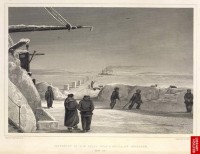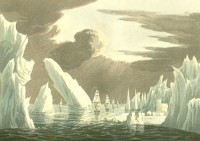By Tony B as posted by Jeff Id on Air Vent
There are many great books about heroic polar explorers, and numerous technical papers by arctic researchers-often rather dry. Few papers with a narrative on the scientific exploration of the arctic during the 19th Century seem to exist as a half way house, accesible to laymen and experts alike, so it is hoped this article may fill a gap.
It was always intended to exist electronically, so links to the relevant information source have been made, rather than citing a printed reference. Whilst generally the narrative can be followed without needing to click on the link, many are interesting in their own right and are often well worth a diversion, (but don’t forget to come back.)
Few external ‘official instrumental’ records exist for this period-or are sporadic in area or time scale- so observations made at the time and place are important to our understanding as to what happened to arctic ice and temperatures in this era. This article has two converging themes; the search for the North West passage and the scientific explorations of the region by a former whaler.
This is somewhat longer than most blog articles, in fact-in truth- it is a a bit of an epic. So close the curtains, turn off the mobile, feed the dog, grab a drink, and order in the pizza for about an hour. Then sit back as the story begins in 1817 when the Royal Society used the enormous resources at their disposal to investigate the claim that THE ARCTIC IS MELTING.

Northwest Passage Attempt 1821
“It will without doubt have come to your Lordship’s knowledge that a considerable change of climate, inexplicable at present to us, must have taken place in the Circumpolar Regions, by which the severity of the cold that has for centuries past enclosed the seas in the high northern latitudes in an impenetrable barrier of ice has been during the last two years, greatly abated…
... this affords ample proof that new sources of warmth have been opened and give us leave to hope that the Arctic Seas may at this time be more accessible than they have been for centuries past, and that discoveries may now be made in them not only interesting to the advancement of science but also to the future intercourse of mankind and the commerce of distant nations.” A request was made for the Royal Society to assemble an expedition to go and investigate. President of the Royal Society, London, to the Admiralty, 20th November, 1817, Minutes of Council, Volume 8. pp.149-153, Royal Society, London. 20th November, 1817 (from John Daly). The quote from the Royal Society is fairly well known, however it is only part of the extract. The missing part - heralded the start of modern arctic science.
Sir Joseph Banks, President of the Royal Society had been particularly interested in reports about ‘unprecedented break up of sea ice at Greenland’ in 1815.’ “Whalers in the North Atlantic in 1815 and 1816 described an unprecedented breaking up of the ice in the Davis Strait, that had apparently sent icebergs as far south as 40°N. The prevailing theory held that seawater could not turn to ice (supported by observations that melted icebergs released fresh water), and therefore that all Arctic ice formed around coastlines. It further held that the waters around the North Pole might therefore be ice-free, forming an Open Polar Sea. If the barriers of ice surrounding this open sea were breaking up, then there might be an opportunity to sail across the top of the North American continent, either by by the proposed Northwest Passage, or perhaps by sailing north past Spitzbergen, across the Polar Sea, and down through the Bering Strait.”

This illustration of arctic Sea Islands comes from 1818. “Passage Through the Ice, June 16, 1818 Lat. 70.44 N” by Sir John Ross, 1819 Princeton Edu.
When Sir Joseph Banks received additional information from the trusted source of young Mr Scoresby during 1817, that must have convinced him that something extraordinary was happening, and he facilitated the resources of the British Admiralty to investigate.
Read the long full post here.




